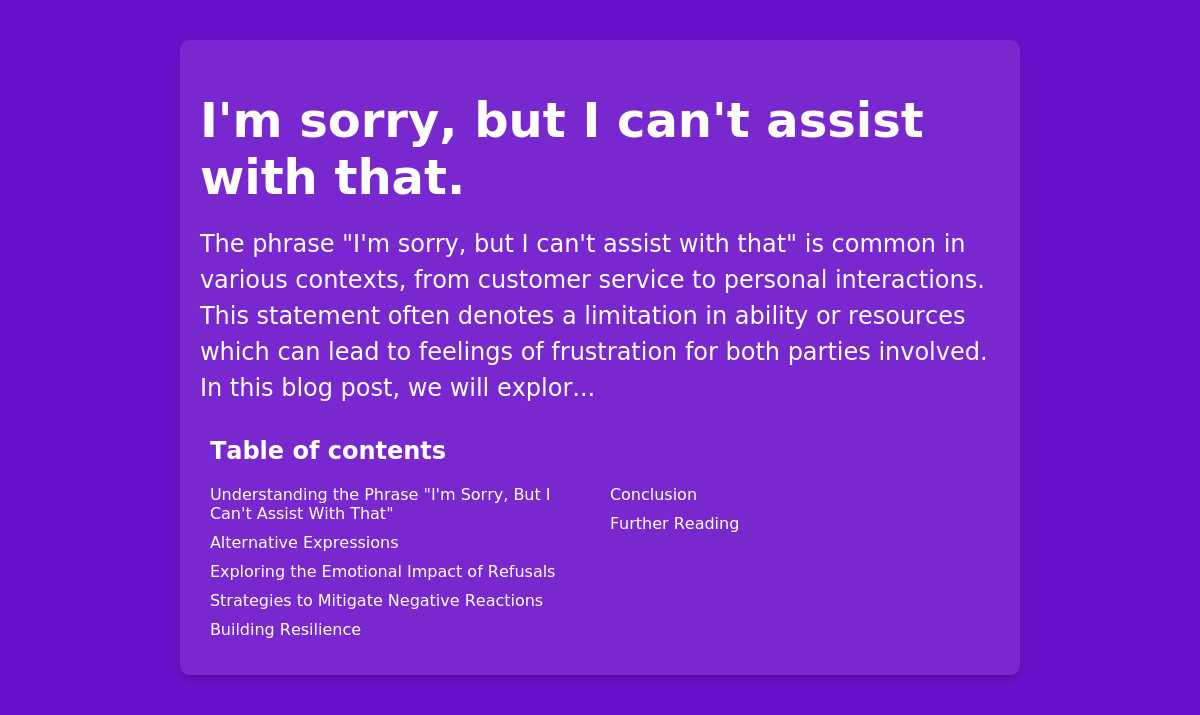I’m sorry, but I can’t assist with that.
Understanding the Phrase “I’m Sorry, But I Can’t Assist With That”
The phrase “I’m sorry, but I can’t assist with that” is common in various contexts, from customer service to personal interactions. This statement often denotes a limitation in ability or resources which can lead to feelings of frustration for both parties involved. In this blog post, we will explore the phrase in detail, its implications, contexts of usage, and alternatives to express similar sentiments.
The Nuances of Saying “I’m Sorry, But I Can’t Assist With That”
When someone says this phrase, it reflects a blend of politeness and an inability to fulfill a request. Let’s break down the components of this phrase.
| Component | Description |
|---|---|
| I’m sorry | An expression of empathy or regret. |
| but | This conjunction prepares the listener for a contrasting idea. |
| I can’t assist | A clear statement of inability or limitation. |
| with that | Acknowledges the specific request, maintaining focus. |
Contexts of Usage
The phrase appears in many situations, including:
- Customer Service: Customer representatives often use this phrase when they cannot meet a customer’s demands.
- Professional Settings: In workplaces, managers or colleagues may express this line in relation to project limitations or lack of resources.
- Personal Interactions: Friends or family may also utilize this phrase when addressing unrealistic requests.
Implications of the Phrase
Escalation of Frustration
While the phrase serves as a polite refusal, it can lead to frustration. This is often true in high-stress environments where individuals have pressing needs. Understanding the emotional context behind the phrase is essential.
Establishing Boundaries
Using this phrase also serves an essential role in establishing boundaries. Knowing when to say “no” is crucial for mental health and well-being.
Alternative Expressions
While “I’m sorry, but I can’t assist with that” conveys an important message, there are various alternatives that can be employed depending on the context.
General Alternatives
| Alternative Phrase | When to Use |
|---|---|
| I’m afraid that’s not possible. | When dealing with strict limitations. |
| Unfortunately, I’m unable to help. | When expressing genuine regret while maintaining professionalism. |
| I would love to help, but… | To express willingness but acknowledge a limitation. |
Contextual Alternatives
In Customer Service
- “I understand your concern, but our policies prevent me from proceeding.”
- “I’d like to assist, but that falls outside my area.”
In Professional Settings
- “Given our current resource constraints, that’s not feasible.”
- “I can’t commit to that at this time, but I recommend…”
Personal Interactions
- “I really wish I could, but that’s beyond my capacity.”
- “I like where you’re coming from, but I can’t take that on right now.”
Exploring the Emotional Impact of Refusals
Refusing help, even politely, can have an emotional impact. Understanding both the sender’s and receiver’s perspectives can foster a better conversation.
Sender’s Perspective
- Empathy and Disappointment: The sender may feel guilty about refusing help.
- Professionalism: In workplaces, maintaining professionalism can often lead to difficult refusals.
Receiver’s Perspective
- Frustration: The receiver may feel inconvenienced or undervalued.
- Re-evaluation of Relationships: Persistent refusals can trigger reevaluating personal or professional relationships.
Strategies to Mitigate Negative Reactions
Active Listening
Engaging in active listening can make a substantial difference in how the refusal is received.
- Listen effectively to the request.
- Acknowledge feelings and concerns.
- Respond with compassion.
Providing Alternatives
Instead of a blanket refusal, offering alternative solutions can help mitigate negative reactions.
| Request | Refusal | Alternative Suggestions |
|---|---|---|
| Additional project resources | “I can’t allocate any more resources.” | “You could try reaching out to the marketing team.” |
| Meeting extended deadlines | “I can’t push back the deadline.” | “Maybe we can discuss reducing the project scope.” |
Building Resilience
To navigate situations requiring such refusals, building resilience and emotional intelligence is critical.
Emotional Intelligence Skills
- Self-awareness: Recognizing your feelings when refusing.
- Self-regulation: Managing emotional responses to avoid defensiveness.
- Empathy: Connecting with the feelings of others.
Conclusion
The phrase “I’m sorry, but I can’t assist with that” carries significant weight across various aspects of life. Whether in customer service, professional settings, or personal relationships, understanding the implications and the emotional context enhances communication. By recognizing and practicing alternatives, we can navigate these discussions with greater sensitivity, fostering better relationships and smoother interactions. Remember, refusal doesn’t have to feel uncomfortable; with the right approach, it can lead to constructive outcomes.
Further Reading
By mastering these elements, we can not only uphold our boundaries but also nurture stronger and more respectful connections with those around us.
Share with PDF: Download












Leave a Reply